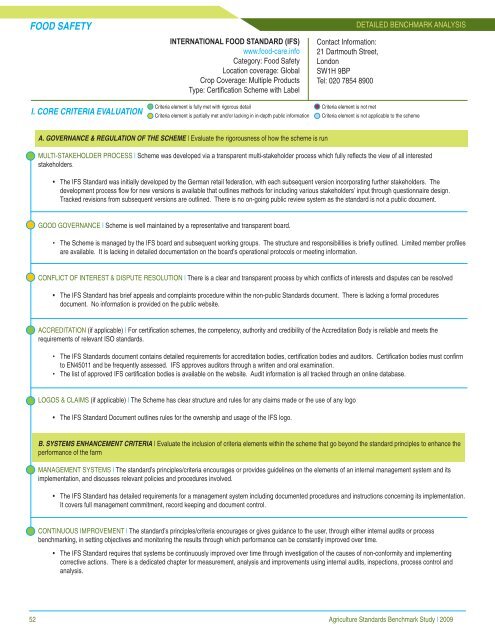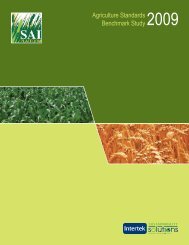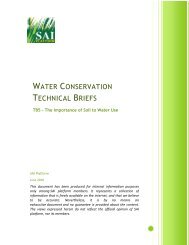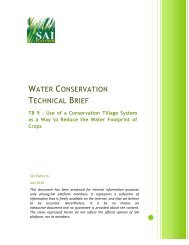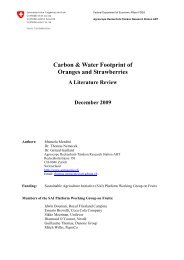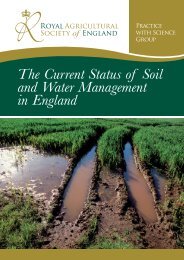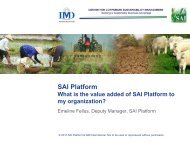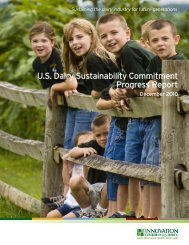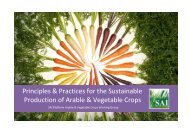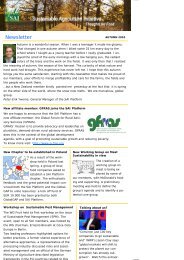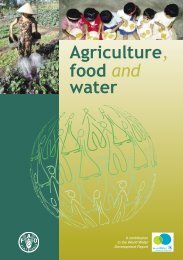DETAILED BENCHMARK ANALYSIS - SAI Platform
DETAILED BENCHMARK ANALYSIS - SAI Platform
DETAILED BENCHMARK ANALYSIS - SAI Platform
You also want an ePaper? Increase the reach of your titles
YUMPU automatically turns print PDFs into web optimized ePapers that Google loves.
FOOD SAFETY<br />
I. CORE CRITERIA EVALUATION<br />
INTERNATIONAL FOOD STANDARD (IFS)<br />
www.food-care.info<br />
Category: Food Safety<br />
Location coverage: Global<br />
Crop Coverage: Multiple Products<br />
Type: Certification Scheme with Label<br />
Criteria element is fully met with rigorous detail<br />
Criteria element is partially met and/or lacking in in-depth public information<br />
Contact Information:<br />
21 Dartmouth Street,<br />
London<br />
SW1H 9BP<br />
Tel: 020 7854 8900<br />
<strong>DETAILED</strong> <strong>BENCHMARK</strong> <strong>ANALYSIS</strong><br />
Criteria element is not met<br />
Criteria element is not applicable to the scheme<br />
A. GOVERNANCE & REGULATION OF THE SCHEME | Evaluate the rigorousness of how the scheme is run<br />
MULTI-STAKEHOLDER PROCESS | Scheme was developed via a transparent multi-stakeholder process which fully reflects the view of all interested<br />
stakeholders.<br />
• The IFS Standard was initially developed by the German retail federation, with each subsequent version incorporating further stakeholders. The<br />
development process flow for new versions is available that outlines methods for including various stakeholders’ input through questionnaire design.<br />
Tracked revisions from subsequent versions are outlined. There is no on-going public review system as the standard is not a public document.<br />
GOOD GOVERNANCE | Scheme is well maintained by a representative and transparent board.<br />
• The Scheme is managed by the IFS board and subsequent working groups. The structure and responsibilities is briefly outlined. Limited member profiles<br />
are available. It is lacking in detailed documentation on the board’s operational protocols or meeting information.<br />
CONFLICT OF INTEREST & DISPUTE RESOLUTION | There is a clear and transparent process by which conflicts of interests and disputes can be resolved<br />
• The IFS Standard has brief appeals and complaints procedure within the non-public Standards document. There is lacking a formal procedures<br />
document. No information is provided on the public website.<br />
ACCREDITATION (if applicable) | For certification schemes, the competency, authority and credibility of the Accreditation Body is reliable and meets the<br />
requirements of relevant ISO standards.<br />
• The IFS Standards document contains detailed requirements for accreditation bodies, certification bodies and auditors. Certification bodies must confirm<br />
to EN45011 and be frequently assessed. IFS approves auditors through a written and oral examination.<br />
• The list of approved IFS certification bodies is available on the website. Audit information is all tracked through an online database.<br />
LOGOS & CLAIMS (if applicable) | The Scheme has clear structure and rules for any claims made or the use of any logo<br />
• The IFS Standard Document outlines rules for the ownership and usage of the IFS logo.<br />
B. SYSTEMS ENHANCEMENT CRITERIA | Evaluate the inclusion of criteria elements within the scheme that go beyond the standard principles to enhance the<br />
performance of the farm<br />
MANAGEMENT SYSTEMS | The standard’s principles/criteria encourages or provides guidelines on the elements of an internal management system and its<br />
implementation, and discusses relevant policies and procedures involved.<br />
• The IFS Standard has detailed requirements for a management system including documented procedures and instructions concerning its implementation.<br />
It covers full management commitment, record keeping and document control.<br />
CONTINUOUS IMPROVEMENT | The standard’s principles/criteria encourages or gives guidance to the user, through either internal audits or process<br />
benchmarking, in setting objectives and monitoring the results through which performance can be constantly improved over time.<br />
• The IFS Standard requires that systems be continuously improved over time through investigation of the causes of non-conformity and implementing<br />
corrective actions. There is a dedicated chapter for measurement, analysis and improvements using internal audits, inspections, process control and<br />
analysis.<br />
52 Agriculture Standards Benchmark Study | 2009


